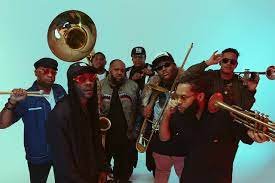Nas Loved Jazz and Harry Connick Jr. Needed a Shave at Jazz Fest Friday

Zimbabwe's Mokoomba was one of the highlights of the first day of the 2017 Jazz Fest.
First Friday felt more like Locals Thursday at Jazz Fest yesterday. The festival didn’t overcrowd the lineup with big name talent, and the crowd was correspondingly comfortable. You could get close to most shows without being a jerk, but if you preferred to be a relaxing distance away, you weren’t lonely. The biggest audience of the day congregated at the Gentilly Stage for Trey Anastasio, but Harry Connick Jr. at Acura and Nas with The Soul Rebels at Congo Square had solid crowds as well.
The Nas show sounded great on paper—the wordsmithing of Nas matched with the street beats of The Soul Rebels—but it didn’t go quite like that. Nas also had his DJ with him, so the band was locked to the familiar beats. Perhaps that was a practical matter. Maybe Nas’ flow is tied to the grooves as he knows them, and the more organic grooves of The Soul Rebels would be hard for him to work with. Maybe Nas wanted to make sure that his fans heard him the way they expected. Whatever the case, the show felt less like a collaboration and more like Nas, backed by The Soul Rebels—a feeling furthered by the band being stationed at the back of the stage. That didn’t make the show weak, but it did feel like an opportunity missed as The Soul Rebels are more kinetic than Nas.
If anyone else felt this way, it wasn’t obvious. Thousands of hands chopped the air as everybody rapped along to “If I Ruled the World,” and when The Soul Rebels got its moments including a few sleazier-than-usual bars of “Sweet Dreams are Made of This,” people were with them too.
Nas played the hits with his usual clear sense of purpose, and perhaps The Soul Rebels’ greatest contribution to the show is that they prompted him to lighten up a little. Nas can get a little professorial, but he had fun with the day, talking about drinking hurricanes, and when a fan in the front row gave him a book wrapped in a blue bow and ribbon, he announced, “I’ll read this on the plane home. Drunk!”
Still, the show came with an acrid aftertaste. Hip-hop cycles through cycles at a dizzying pace, and cutting edge in the mid-‘90s is old school now—a truth Nas didn’t seem comfortable with. He didn’t take shots at anyone, but his announcement that he loves jazz and A Love Supreme, along with overt shout outs to old school hip-hop and specifically De La Soul and A Tribe Called Quest, felt like ways of drawing cultured lines between him and the United Rap World of Atlanta. Match that with his tendency toward humorlessness, and while moments like “Hate Me Now” blew up, I couldn’t shake his core grumpiness after the show was over.
Elsewhere at Jazz Fest
- Nas spoke of how he was touched by Michael Jackson as his DJ segued from “Human Nature” into “It Ain’t Hard to Tell,” which samples the song. It was the second time in an hour on the Congo Square Stage that Jackson was referenced. Singer Mathias Muzaza of Mokoomba engaged in a few Jackson-like dance steps, not in a winking show of his own cleverness but as a part of his own dance language. Obviously, the flow of inspiration was a two-way street, but I haven’t seen another African act employ the staccato movements Muzaza echoed.
I wouldn’t pay as much attention to it if the band’s body language didn’t communicate more clearly than its lyrics, sung in three native Zimbabwe tongues. Muzaza sang a sombre song with one hand folded over his chest for the duration, and the moment’s gravity was obvious. When Muzaza moved like Michael and the band danced with him, the joy was equally apparent.
- There’s Casually Unshaven, there’s Touring Indie Band Unshaven, and Friday at Jazz Fest, Harry Connick Jr. reached Jumping Boxcars Unshaven. Somewhere backstage, a lonely bindle heard the open road calling its name.
- The audience had the wrong drugs to dance to DJ Shub, so he brought his own dancer to enliven the show’s early moments. The bright blues and yellows in his suit were almost vibrant enough to pass muster at Buku.
- I root for Leon Bridges, even though I have yet to be moved by him. The Texas R&B singer reaches back in Sam Cooke’s direction vocally, and his band gets back to the blues and R&B from the ’50s and ’60s as well, adding a little muscle to his easy personal groove. I love how current he seems considering all the retro signifiers onstage, but as was the case when he played Tipitina’s in 2015, the lack of compelling choruses meant my attention wandered. A key difference between contemporary retro artists and those they refer to—songs. Grooves were not enough.
- I finally saw Trumpet Mafia in the Jazz Tent, and now I want to see them elsewhere. The wall of trumpets became smaller when run through a PA, and I can only imagine how cool it could be to hear them all acoustically.
- First Soundman on Notice: Whoever mixed Meschiya Lake at the Acura Stage and treated the Little Big Horns indifferently. Her voice—never a timid instrument—was easily front and center, while the band tangled for sonic space.






